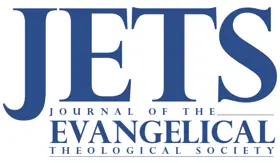
Journal of Evangelical Theological Society
Website
https://www.etsjets.org/JETS
Reviews
The Book of Deuteronomy: Chapters 1–11. NICOT. Eerdmans, 2022.
For each passage, Arnold gives his own fresh translation of the Hebrew text and provides extensive textual critical notes with rationale, which is a special component of this commentary. He even incorporates the apparatus of the currently-in-progress BH into his discussion and thus is very thorough in discussing text-critical issues. After the translation and text-critical sections for each passage, Arnold provides comprehensive discussion of each verse, accompanied by copious footnotes in support of his arguments and providing resources for further study...
In addition, those who consult this commentary will find not only solid grammatical and extended exegetical discussions but also discussion of frequently debated issues in Deuteronomic studies. For example, Arnold addresses how to translate and understand the Shema Deut 6:4) with its simple wording but complex syntax, the importance of the creedal passage of Exodus 34:4 6 in conjunction with Deuteronomy (p. 325), or how to deal with the parallel passages in Exodus and Numbers (p. 549)....
This book does an excellent job of unpacking the riches of what is arguably the most important theological book of the OT, and I am sure that it will of great service to many a future user seeking grammatical, syntactical, and exe-gerical wisdom from hasebonomy 1-11. However, the wonderful information in this commentary (perhaps because of the limitations of technical exegetical commentaries like those in the NICOT series) is presented in a style devoid of direct personal appeal to the reader to respond in tangible ways; this runs counter to what I think Deuteronomy is intended to do for readers who engage it. The later OT prophets draw heavily upon Deuteronomy to call God's people to actively and lovingly live out their covenant agreement at Sinai, and even Jesus used Deuteronomy in practical ways in defeating the devil's temptations (Matt 4). Those who use this great resource are encouraged to soak in all the information it provides and then deeply reflect on what it looks like in their own setting to "Love the Lord your God with all your heart and with all your soul and with all your might" (Deut 6:5).
Jonah. Herm. Fortress Press, 2022.
Susan Nidich focuses her research on oral literature and folklore as they apply to the OT. Such studies inform her latest commentary. [This] is not the typical historical critical study one might expect from the Hermeneia series. Though the author interacts with critical scholars and provides her own translation with text-critical analysis, the work focuses on questions like religious identity and how the story of Jonah is used in international folklore...
[T]he book is organized in the standard Hermeneia format, with a fresh translation, textual notes, and verse-by-verse commentary. Niditch's translations are quixotic and very wooden, sounding "Yoda-like." Consider for example Jonah 1:9: "A Hebrew am I, and Yahweh ... I fear" (p. 38). She states that She wants to reflect the Hebrew style, but the approach goes overboard. In her textual commentary, Niditch gives a good sense of the story as it happens, noting the repetition of vocabulary and explaining themes (such as going downward into the ship/ocean). Unlike other commentaries, though, Niditch concludes each pericope with an overview discussion that addresses comparative folklore and textual whichin... As to the usefulness of the commentary, that depends upon what the reader is looking for. For detailed comments on the text one should look elsewhere. For information on how themes are appropriated in (or at least similar to) later cultures, this commentary excels. The commentary is full of interesting bits of information, such as Pirge R. Eliezer's writing on Jonah being carried to the temple locus while in the belly of the creature. However, Niditch does not then return to how these later appropriations might help one understand the meaning of the text. For a unique look at Jonah and its afterlife, this commentary provides help. For understanding this portion of Scripture, better options exist.
Daniel. EEC. Lexham Press, 2020.
I found this commentary to be immensely helpful. While at 780 pages, it can be cumbersome, the writing style is remarkably fluid and well maintained throughout. Any scholar, Bible student, or pastor would be well served to own a copy of Tanner’s Daniel commentary. It may not be as straightforward as some would like, but it is a commentary that believes as it explains. In other words, the presuppositions are premillennial and the theological perspective is one of the inerrancy of Scripture. He takes a conservative position on the date and authorship of the book of Daniel, which is rare in most modern commentaries. Any serious Bible student would be impressed with Tanner’s treatment on the most difficult interpretation regarding the prophecy of the seventy weeks. His structure is also well done. Many commentaries on Daniel are judged based on the author’s prophetic opinions or presuppositions before they are ever read. I encourage readers of this review not to let that be an issue that prevents the acquisition of this fine work.
[Full Review]
